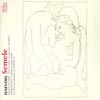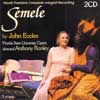Handel Semele
A thoroughly refreshing treatment of Handel’s delightful oratorio, plus a lively première of an earlier abandoned Semele
View record and artist detailsRecord and Artist Details
Composer or Director: George Frideric Handel
Genre:
Opera
Label: Pierre Verany
Magazine Review Date: 13/2004
Media Format: CD or Download
Media Runtime: 126
Mastering:
Stereo
DDD
Catalogue Number: PV704021/2

Tracks:
| Composition | Artist Credit |
|---|---|
| Semele |
George Frideric Handel, Composer
Danielle de Niese, Soprano David Stern, Conductor Ernesto Tres Palacios, Tenor George Frideric Handel, Composer Guillemette Laurens, Mezzo soprano Jonathan May, Bass Louise Innes, Mezzo soprano Opera Fuoco Chorus Opera Fuoco Orchestra Paul Agnew, Tenor Sébastien Fournier, Countertenor Susan Miller, Soprano |
Composer or Director: John Eccles
Genre:
Opera
Label: Forum
Magazine Review Date: 13/2004
Media Format: CD or Download
Media Runtime: 120
Mastering:
Stereo
DDD
Catalogue Number: FRC9203

Tracks:
| Composition | Artist Credit |
|---|---|
| Semele |
John Eccles, Composer
Anthony Rooley, Conductor Barbara Clements, Iris, Soprano Bragi Thor Valsson, Somnus, Bass Brenda Grau, Juno, Contralto (Female alto) Christopher Swanson, 1st Auger, Tenor Christopher Swanson, 2nd Priest, Tenor Erica Cochran, 1st Cupid, Soprano Florida State University Opera Orchestra John Eccles, Composer Kathleen Phipps, Athamus, Contralto (Female alto) Kyle Ferrill, Cadmus, Bass Lee Taylor, Ino, Contralto (Female alto) Leslie Mangrum, Semele, Soprano Lianne Coble, 2nd Cupid, Soprano Mathew Roberson, Jupiter, Tenor Michael Moreno, Chief Priest, Bass Scott MacLeod, Apollo, Tenor |
Author: Edward Greenfield
Fast speeds and cuts means that David Stern’s performance comes on two discs instead of Nelson’s three. His cast is not as distinguished as Nelson’s or Gardiner’s, nor as characterful. Yet the mezzo, Guillemette Laurens, makes a striking and convincing Juno. Occasionally she may reveal that English is not her native tongue, but generally one marvels at the idiomatic way she presents the formidable goddess.
The bright, fresh-toned Danielle De Niese makes an innocent-sounding Semele, relishing such big numbers as ‘Endless Pleasure’ and ‘Myself I shall adore’. Though the microphone catches some shrillness, she is amazingly agile, apparently unfazed by Stern’s hectic speeds, as well as being suitably relaxed in the broad phrases of ‘O sleep why dost thou leave me’.
Other cast members are comparably agile, though I suspect that none is flattered by the acoustic: Susan Miller as Iris sounds unpleasantly edgy. Paul Agnew is a virtuosic Jupiter; Jonathan May doubles as both Cadmus and Somnus, more convincing in the latter role. The Scottish soprano Louise Innes, light and fresh as Semele’s sister Ino, makes her mark positively, and the warm-toned countertenor, Sebastien Fournier, as Athamas is impressive enough to make one regret the loss of his arias. The tiny role of Apollo in the final scene is well taken by the honey-toned Ernesto Tres Palacios, promoted from the excellent chorus, 12 singers strong. In sum, a mixed bag, though an interesting and always refreshing alternative.
In 1707, 36 years before Handel wrote his Semele, John Eccles used William Congreve’s drama as the basis of his last opera, collaborating closely with the celebrated dramatist. Eccles was regarded very much as Purcell’s successor but he and Congreve saw the way that Italian opera was attaining dominance, and Eccles’s Semele was never performed. Stoddard Lincoln even suggests in the New Grove that ‘Had Semele been produced, it might have laid the foundations of a national English opera’.
We owe this première recording not only to the enterprise of the opera department of Florida State University but to the enthusiasm of Anthony Rooley, who likens the collaboration of Eccles and Congreve to that of Gilbert and Sullivan or Rodgers and Hammerstein. As he says in his note: ‘Eccles takes us at a whirlwind pace through the story…brings us to the edge of our seats with his style of agitated music – melodies memorable, harmonies to delight and rhythmic variety of great invention.’
Jolly numbers in compound time predominate, and the emotional range of Eccles, not surprisingly, falls short of Handel’s. Such lines as ‘Sleep, why dost thou leave me’ and ‘Myself I shall adore’, which inspired Handel to supremely memorable arias, are simply passed over in the middle of recitative.
Still, there is much to enjoy, as in the inventive opening to Act 3 on gentle pizzicati from the strings. It is surprising, too, to have a cymbal crash each time Juno pronounces a curse on Semele, and some of the obbligato solos are delightful: the recorder in Cupid’s aria in Act 2, for example. How different this is in its fluidity from the formality of the Italian opera style which displaced it.
With a cast of young singers, some with voices not fully formed, Rooley directs a lively, most enjoyable performance, cleanly recorded with voices well forward and only occasional Trans-atlantic pronunciations. Standing out is the characterful Juno of Brenda Grau, well contrasted with the sweet, fluent Semele of Leslie Mangrum. The writing for Jupiter lies awkwardly between tenor and baritone, and Mathew Roberson copes well with one or two awkward exceptions. The orchestra too reflects excellent teaching by the University’s Early Music Department, limited to solo strings, Baroque oboe and recorder, with multiple continuo for organ, two harpsichords and harp.
Discover the world's largest classical music catalogue with Presto Music.

Gramophone Digital Club
- Digital Edition
- Digital Archive
- Reviews Database
- Full website access
From £8.75 / month
Subscribe
Gramophone Full Club
- Print Edition
- Digital Edition
- Digital Archive
- Reviews Database
- Full website access
From £11.00 / month
Subscribe
If you are a library, university or other organisation that would be interested in an institutional subscription to Gramophone please click here for further information.




